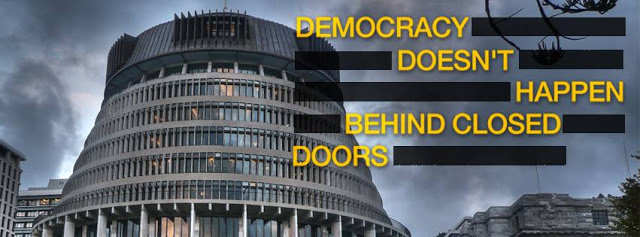The debates on the Trans Pacific Partnership Agreement seem to get more and more polarised – some people insisting that this agreement has nothing to do with trade, or free trade and represents a consolidation of corporate power. These people say it challenges sovereignty by making it difficult for government to make decisions in the interest of public health, safety and governance and will allow investor trade disputes, while also offshoring jobs to countries where labour is the cheapest.
On the flip side, supporters or those who are indifferent say that governments are all the same, Labour would support the TPPA just as blindly, this process was started under a Labour government or she’ll be right on the day – nothing could possibly be as bleak as detractors make out.
And yet, eight of Auckland Council’s Local Boards have spoken out about their concerns. The Auckland Council has requested that the Regional Strategy and Policy Committee request the government to publicly release the agreed text and consult widely with local government and citizens before ratifying the Trans Pacific Partnership Agreement (TPPA).
Meanwhile Horizons Regional Council, Wanganui District Council, and Greater Wellington Regional Council have also questioned the benefit of the TPPA and the processes around its adoption. In total these councils represent 60% of the NZ population.
Leading groups in civil society from jurists, medical professionals, university lecturers and NGOs have spoken out against the agreement. Over 100,000 citizens have signed petitions and/or attended protests and rallies. Overseas, governments are also struggling to get public acceptance for the trade agreement.
So what’s the fuss about? I thought I’d try and pick my way through some of the leaked agreement, (thank you Wikileaks for this), to see if was really as bad as people make out.
I started to hyperventilate as I realised that although I couldn’t understand everything, what I could understand did not seem good – see extracts from the text on Intellectual Property and my italics below.
Principles
- Parties may, in formulating or amending their laws and regulations, adopt measures necessary to protect public health and nutrition, and to promote the public interest in sectors of vital importance to their socio-economic and technological development, provided that such measures are consistent with the provisions of this Chapter.
Article QQ.A.5: {General Provisions / Nature and Scope of Obligations}
Each Party shall give effect to the provisions of this Chapter. A Party may, but shall not be obliged to, provide more extensive protection for, and enforcement of, intellectual property rights under its law than is required by this Chapter, provided that such protection and enforcement does not contravene the provisions of this Chapter.
Excuse me…. double take? I thought that the challenge to sovereignty was in the opportunity for investor trade disputes and the ability of corporations to take governments to court. Clearly, I’m naïve. There are so many references in this chapter to the fact that the agreement becomes the authority that needs to be complied with when making or changing national laws. But aren’t laws made in the best interests of a country’s citizens? And how can a trade agreement demand that laws made for the public good be changed to be compliant with a trade agreement?
Tobacco, alcohol, fast food and sugar are all examples of products where laws and public education campaigns are designed to encourage limitations to consumption. The implication is that government would no longer be able to make public health decisions if these interfered with a company’s ability to sell their products.
As an elected representative, who works hard to do things in the best interests of my community I’m alarmed as I strongly feel effective governance and democracy are being undermined through a trade agreement which is putting itself above the laws of the country.
So what can still be done…
Firstly be outraged – by the content, the fact the government is still refusing to engage in public and parliamentary debate around it, but also by the fact we can only read it because it has been leaked.
Secondly, realize that we are not an isolated country. People everywhere are fighting the same battles – whether in Australia, the USA, Singapore or Japan.
And mostly know that the agreement HAS NOT BEEN SIGNED YET. It reached governments around October 1st, but it won’t be presented for signing in NZ until the 4th of February.
Meanwhile, it’s possible that the American Congress, who have the power to veto the ability of the US President to sign, may exercise that right. This also makes for interesting reading in the parts of the American press that are covering the stories. The Huffington Post is quite vocal on the issues including implications for food labelling, undermining of worker rights and the fact that no free trade agreement has ever improved conditions for working people.
The latest initiative in New Zealand, is to ask the Governor General to request that the TPPA is put to a binding referendum. Find out more or download the petition from here.
It’s also useful to write to your MP, councilors and local board members outlining your concerns around the threat posed by the TPPA to their authority and ability to make decisions in the national interest, and to request that they put more pressure on the government to initiate a full public and parliamentary debate on the issues before signing. They should also ask Local Government NZ to investigate the implications of being part of the TPPA.
Public debate is one of the cornerstone of democracy. If only we could have as much debate, and a referendum, on the TPPA as we’ve had on the flag we could feel reassured that NZ interests are being addressed.
Shirin Brown is a teacher, film-maker and playwright and currently teaches in digital media and film theory at AUT. She was elected to the Waiheke Local Board in 2013 and has always felt it is important to speak out against injustice and for the rights of women and minorities. Her early memories include standing outside the South African embassy in London, protesting against the poll tax and demanding that the US stop their covert actions in Nicaragua.






If and when Bernie Sanders wins next years U.S presidency, we will be able to kiss TPP adios.
We’re still in the same position as when the text was released by MFAT. Until the next U.S president signs TPP, it is nothing but hot air and sweet nothings from Key and co
Key and his suck up govt reminds us all of a broken down starship Enterprise manned by idiots and clowns drunkenly and mindlessly sputtering through the galaxy and going ‘ blindly where no person has ever gone before’ …
And the only Klingons on the starboard bow are the 1%’ers who are pushing this TTPA.
”Its worse than that , – its dead , John. ”
How can a party to the agreement leave the TPPA do you know?
+100 Shirin Brown
Good links..
https://www.facebook.com/groups/TPPActionGroup/?fref=nf
http://www.flushthetpp.org/nationwide-mobilization-to-stop-the-tpp-off-to-a-strong-start/
http://www.flushthetpp.org/8-terrible-things-about-the-trans-pacific-partnership/
http://www.flushthetpp.org/exxonmobil-peabody-coal-lobby-to-remove-climate-language-from-trade-deals/
We live in a representative democracy. As such we vote for representatives to decide policy on our behalf with consultations from us. Binding referendums by pass this arrangement. People had the option during the last election to vote for parties that opposed the TPPA. The party that best represents the voices stating that the agreement is as bad as some make out failed to win a single seat.
Since you have obviously researched the agreement extensively perhaps you can educate us on what the provisions are in egard to leaving the agreement at some stage in the future?
The impression I get is that the general attitude among many of our comrades on the Left is that agreements like TPP are a bit like climate change.
They are way too complex for our limited ability to reason, so we make up our minds to be guided by advisers and experts. Then it comes down to a beauty contest among the cognoscenti. Which expert do you want to believe?
I still have not much idea of whether or not the TPPA would be good for New Zealand, overall, or bad. But I do know one thing. As things stand, we stand or fall on our ability to trade with the rest of the world.
Because we have a small population, we are in no position to trade our way to prosperity among ourselves. We are not like bigger countries with large populations who can self-indulgently cut themselves off from the rest of the world. New Zealand exports a proportionally higher percentage of our national production than almost any other Western-style democracy. We cannot be complacent about the rest of the world wanting or needing our products (check milk exports to our close friends in China this year). We need the rest of the world far more, FAR MORE than they need us. It may or may not be true that no worker has had their wages lifted when a free trade agreement is signed, (I don’t know, do you? …go ask your favourite expert), but you can be sure that wages are slashed when the opposite happens. Go ask the Cubans.
Comments are closed.